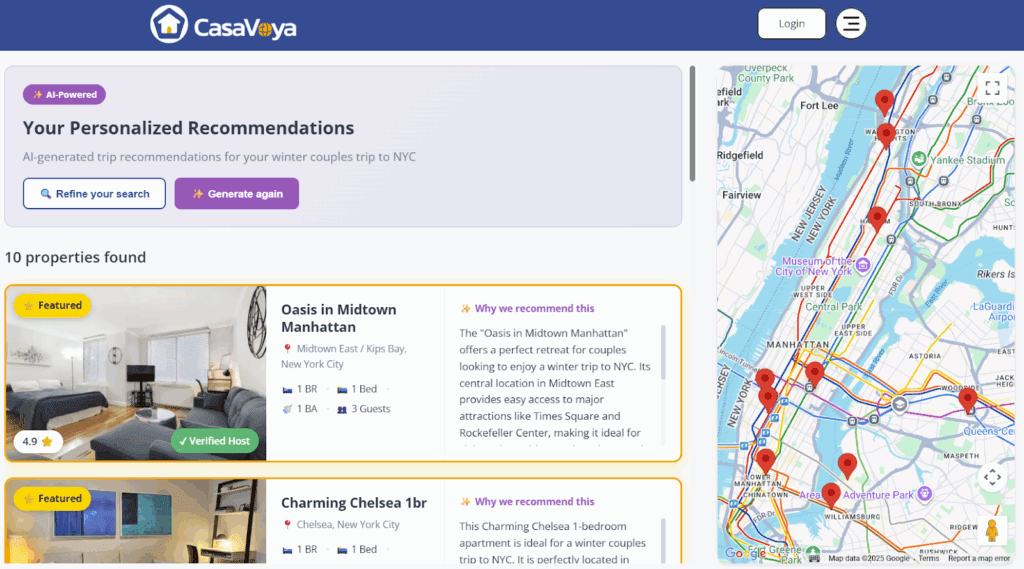Finding the perfect vacation rental can be a frustrating process. Travelers often have a clear idea of the trip they want—a quiet romantic weekend, a bustling family holiday, or a trip centered around cultural events—but are forced to translate that vision into a rigid set of filters. Those with flexible dates fare the worst: searching for “any weekend in July” means running multiple queries and comparing results manually. The result? Endless scrolling through properties that technically match some criteria but completely miss what the trip is actually about.
To solve this travel discovery problem, vacation rental platform CasaVoya is deploying a sophisticated, multi-model AI strategy. By leveraging technology from both OpenAI and Anthropic, CasaVoya transforms how users find and evaluate properties. We spoke with Sasha Ramani, Board Member and Artificial Intelligence Advisor at CasaVoya, to understand how this AI-powered approach interprets natural language, synthesizes thousands of reviews, and builds the trust necessary to connect travelers with the right hosts.
Q: Most rental platforms rely on structured filters. What is the fundamental problem with that model, and how is CasaVoya approaching search differently?
Sasha Ramani: The filter-based model forces users to think like a database. When someone plans a trip, they don’t start with “I need exactly 2 bedrooms within 1.5 miles of Times Square”—they think “We’re visiting for our anniversary and want to be near great restaurants and Broadway theaters.” That’s a completely different mental model.
Traditional filters also create a false precision problem. You might filter for properties under $200/night, but miss a $210 property that’s actually perfect for your needs. Or you select “2 bedrooms” but overlook a large one-bedroom with a convertible space that would work beautifully for your group.
CasaVoya’s approach flips this entirely. Our AI interprets the intent behind natural language queries. When someone searches “family Thanksgiving in New York,” the system understands they need accommodations around late November, space for multiple people, probably a full kitchen for holiday meals, and perhaps proximity to family-friendly attractions or quiet neighborhoods. This is especially powerful when a traveler’s dates are not strictly defined: say, a trip that occurs over any weekend in January. The AI considers all these dimensions simultaneously rather than forcing the user to manually specify each one.
Q: Your platform uses conversational search to interpret user queries. Can you walk us through how the AI translates a general idea, like “girls’ weekend to see shows,” into specific property recommendations?
Sasha Ramani: That’s a great example because it demonstrates how much context is packed into a simple phrase. When our AI processes “girls’ weekend to see shows,” it’s extracting and inferring multiple data points:
First, the temporal context: “weekend” suggests a 2-3 night stay, likely Friday through Sunday. Second, the group composition—”girls’ weekend” implies a small group of friends, probably 2-4 people, who value multiple beds and shared space for socializing. Third, the activity intent—”see shows” strongly suggests Broadway or theater district proximity, which maps to specific Manhattan neighborhoods like Midtown West, Hell’s Kitchen, or Times Square area.
But the AI goes deeper. It understands that people attending shows typically want evening dining options nearby, convenient subway access, and probably aren’t concerned about quiet streets since they’ll be out late anyway. It might also infer that aesthetic appeal matters more for this trip type than, say, a business traveler’s functional stay.
The system then queries our property database not just for listings in Theater District, but for properties that previous guests described as “great for groups,” “walkable to restaurants,” “stylish,” or “convenient to entertainment.” It’s matching the query’s holistic profile against properties’ aggregated characteristics.
What we’re really doing is building a semantic understanding of travel intent, then mapping that to property attributes that exist both in structured data and unstructured review content. That’s why we can surface the right listings even when they don’t contain exact keyword matches.
Q: Travelers often face “review overload” with hundreds of guest reviews per property. How does CasaVoya’s AI help users make sense of this information, and how does it feed back into your search algorithm?
Sasha Ramani: Some of our properties have hundreds of reviews, and expecting someone to read through all of them to understand whether a place suits their specific needs is unrealistic. But those reviews contain incredibly valuable signal—you just need AI to extract it.
Our review intelligence system processes the entire corpus of reviews for each property to identify patterns and themes. It’s not just summarizing—it’s performing sentiment analysis across multiple dimensions. The AI might identify that families with young children praised the space and safety features, while couples consistently mentioned the romantic ambiance and walkability to date-night restaurants. That’s actionable intelligence.
We also extract trade-offs. Maybe reviews indicate the property is perfect for location but the building elevator is slow, or it’s beautifully appointed but the street can be noisy. The AI surfaces these patterns so travelers can make informed decisions based on what matters most to them.
This feeds directly back into search. When someone queries “quiet place for remote work,” our AI knows from processed reviews which properties guests described as peaceful, which have fast WiFi, and which have dedicated workspace—even if the host never explicitly advertised those features. We’re essentially crowdsourcing property characterization through thousands of authentic guest experiences.
We’re also using AI to translate all reviews into multiple languages since we serve guests from 22 countries. A traveler can read authentic feedback from a Japanese guest, with all the nuance and sentiment preserved. That’s transformative for international travelers trying to evaluate New York City vacation rentals.
Q: CasaVoya uses APIs from both OpenAI and Anthropic. Why take a multi-model approach rather than standardizing on one provider? What’s the strategic advantage?
Sasha Ramani: This is a question we get a lot, and the answer is pretty pragmatic: different models excel at different tasks, and vendor lock-in creates unnecessary risk.
For conversational search, we need models that can handle complex reasoning across multiple dimensions—understanding temporal references, group dynamics, activity intent, and location requirements simultaneously. For review summarization, we need strong comprehension of nuanced sentiment and the ability to identify patterns across hundreds of documents. For translation, we need both accuracy and cultural context preservation.
We’ve found that certain Anthropic models perform exceptionally well for tasks requiring deep reasoning and contextual understanding, while OpenAI models excel in other areas. By leveraging both, we optimize for performance on each specific use case rather than forcing a one-size-fits-all solution.
There’s also a resilience factor. If one API experiences latency issues or outages, we can fail over to alternative models for critical features. When search and review intelligence are core to your product experience—not nice-to-have features—that redundancy matters.
Finally, the AI landscape evolves rapidly. New models emerge, existing ones improve, pricing structures change. By architecting our system to be model-agnostic, we maintain flexibility to adopt new capabilities as they become available without rebuilding our entire stack.
The key is treating LLMs as tools in a broader system rather than as the system itself. We’re building infrastructure that can leverage the best of what’s available now while remaining adaptable for what’s coming next.
Q: CasaVoya operates as an “introduction service” rather than a booking platform—a unique model that allows compliance with New York City’s strict short-term rental regulations. How does your AI-powered discovery process create the trust needed to make this model work?
Sasha Ramani: Because CasaVoya doesn’t process bookings, travelers need extremely high confidence in their property selection before they connect with a host. That means our discovery and evaluation tools need to be exceptional.
The AI-powered search ensures that when someone finds a property, it’s genuinely well-matched to their needs—not just algorithmically adjacent. Poor matches erode trust fast. If I search for “family trip” and get listings that are clearly better suited for solo travelers, I lose confidence in the platform’s ability to serve me.
The review intelligence is equally critical. By synthesizing thousands of authentic guest experiences into clear, structured insights, we’re essentially providing transparency at scale. Travelers can see patterns around host responsiveness, property accuracy, cleanliness, location convenience—all the factors that determine whether a stay will meet expectations. Importantly, we surface reviews that highlight negatives—such as street noise—when multiple guests mention the same issue, so travelers understand trade-offs before connecting with hosts.
In highly regulated markets like New York City, operating as an introduction service is what allows us to operate as a viable alternative to Airbnb and traditional booking platforms. Our AI doesn’t just make discovery easier—it makes our entire business model viable by building the trust infrastructure necessary for direct connections between hosts and guests.
Q: You’ve successfully operated in New York City, one of the most regulated vacation rental markets in America. As CasaVoya expands to new cities, how is AI helping you navigate different regulatory environments?
Sasha Ramani: Regulatory compliance is actually an area where AI can provide significant value that most people don’t think about. Different cities have different rules regarding short-term rentals. Some restrict rental duration, some require registration numbers, some have neighborhood-specific regulations. Keeping track of this manually across multiple markets would be operationally complex.
We’re using AI to help ensure properties are compliant with local regulations in each market we enter. The system can flag potential issues and help hosts understand their obligations.
As we scale globally, this becomes even more critical. Regulations in Barcelona are different from London, which are different from Tokyo. AI helps us maintain that compliance infrastructure without building entirely separate systems for each market. It’s not glamorous, but it’s essential for operating sustainably in regulated environments.
The insights from CasaVoya demonstrate a mature and practical application of AI in the travel industry. By moving beyond superficial implementations, the platform addresses core user pain points: the difficulty of expressing complex travel needs through simple filters and the challenge of synthesizing vast amounts of user-generated review data. This multi-model, problem-solving approach creates tangible value for both travelers and hosts.
As AI continues to evolve, CasaVoya’s strategy offers a compelling case study for how to deploy the technology effectively. By focusing on user value rather than novelty and integrating AI into the core product, they are not just improving search results—they are building the trust and confidence needed to create better travel experiences from the very first click.
Explore New York City vacation rentals with AI-powered search at CasaVoya.com






























